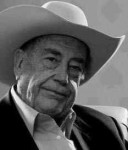
Note: Not at the old Poker1 site. A version of this entry was first published in the London Telegraph in 2005.
Historical note: The following explanatory note didn’t appear in the series, but was sent with each column as submitted.
Doyle “Texas Dolly” Brunson stands unchallenged as the most celebrated poker player who ever lived. In 2005, at age 72, he won an unprecedented 10th championship gold bracelet at the World Series of Poker. He is among the few living members of the Poker Hall of Fame, and his books are the bibles for poker professionals.. Through www.poker1.com and www.doylesroom.com, Brunson has teamed with Mike Caro, today’s premiere poker educator, to offer a free learning experience to players worldwide. This column is founded on those collaborative teachings.

Let me tell you about a lesson I learned years ago. I had partnered up with Toby to share all our expenses and split all our profits. My specialty was poker, but Toby liked to bet the horses and make weird wagers on just about anything.
There was a flamboyant 50-year-old gambler called Colonel Ed. The Colonel was known to offer all manner of bizarre bets. One thing I can tell you for certain is that when someone else offers you a bet, no matter how obvious it seems that you have an edge, you probably don’t. Generally, you should avoid accepting another man’s wagers, because he’s had a long time to scheme and refine it. It’s unlikely that he’ll be offering it to you unless he knows already that it works for him.
Different
But the Colonel was a bit different. Many a Texas rounder had come out ahead on propositions that the Colonel had offered. Still, Toby had been running badly and I had been supporting both of us with my poker winnings. Our combined bankroll at the time hovered around $6,000, and I wasn’t eager to risk putting any dents in it.
So after the Colonel said he’d play us five-card draw poker, I lost interest when I heard the entire proposition. He said he’d play a series of $1,000 freeze-outs heads-up against one of us. Whenever we lost, we got a 50 percent discount and only had to pay $500. The catch was that the Colonel would get to look at his first five cards and exchange them for five new ones before there was any betting.
Toby was eager to play. “Let’s take a chance,” he urged me.
But I declined, saying that neither of us could accurately determine what the odds were without further thought. I just didn’t want to risk it right then. But Toby said, “I want to play,” and I said, “Well, Toby, then you’re going to have to play on your own.”
It was a painful parting. “I guess we’re not partners anymore,” he stammered, a noticeable creak to his voice.
“I guess not,” I sighed.
Well, Toby won the first match. And the next one. I noticed that Colonel Ed was making poor choices on when to exchange his first five cards. And before it was over, hours later, Toby had won all the hundred dollar bills the Colonel had available and several checks – a total of $35,000.
A consolation prize
As Toby rose from the table with his winnings, Colonel Ed extracted the last cash from his pocket – three crumbled $20 bills. “Want to play seven-stud for these, Doyle?” he asked.
So, I sat down, and as a consolation prize, I ended up winning that $60, instead of the $17,500 that would have been my share of Toby’s score. That was the day Toby and I parted, and I’ve never heard from him since.
But the lesson I learned that day far exceed that $17,500 in worth. Toby had argued that if he lost the first match, we would just quit $500 poorer, but – knowing the Colonel – if the proposition turned out to be favorable, we might expand our bankroll significantly.
He had said, “Doyle, let’s take a chance.” Whenever I tell this story, I point out that never had someone’s words seemed so reckless and been so right. Sometimes you’ve got to pay to find out. In poker, like in life, information has value.
— DB
